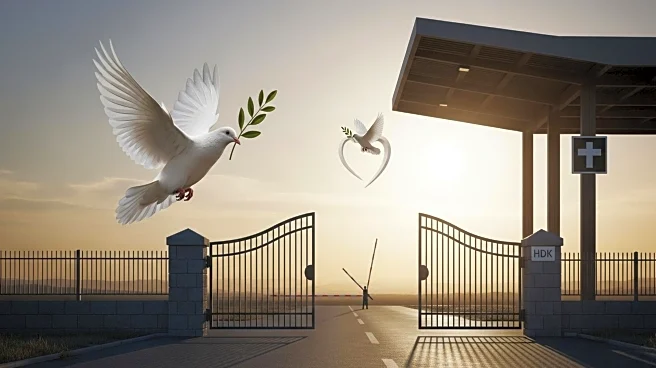What's Happening?
A Hamas official has announced that the Rafah border crossing between Egypt and the Gaza Strip is set to open next week. This development comes as trucks carrying humanitarian aid are lined up near the crossing, ready to enter the region. The announcement also includes plans for fuel and humanitarian aid to enter Gaza starting tomorrow. Mediators have reportedly begun discussions to resume operations of the Gaza Electric Company, which is crucial for providing electricity to the area. The Rafah crossing is a vital entry point for supplies and aid, especially amid the ongoing conflict between Israel and Hamas.
Why It's Important?
The opening of the Rafah crossing is significant as it facilitates the entry of essential supplies and humanitarian aid into Gaza, a region heavily affected by conflict. This move could alleviate some of the humanitarian challenges faced by the residents, including shortages of food, medical supplies, and fuel. The resumption of operations at the Gaza Electric Company is also crucial, as it would restore electricity, impacting hospitals, homes, and businesses. The involvement of mediators suggests ongoing diplomatic efforts to stabilize the situation and improve living conditions in Gaza.
What's Next?
With the Rafah crossing set to open, stakeholders including humanitarian organizations and government entities are likely to increase their efforts to deliver aid to Gaza. The discussions to resume the Gaza Electric Company operations may lead to improved infrastructure and services in the region. However, the ongoing conflict poses challenges to these efforts, and the situation remains volatile. Continued diplomatic engagement and negotiations will be essential to ensure the sustained flow of aid and resources.
Beyond the Headlines
The opening of the Rafah crossing highlights the complex geopolitical dynamics in the region, involving multiple stakeholders including Egypt, Hamas, and Israel. The humanitarian aspect underscores the urgent need for international cooperation to address the needs of civilians affected by the conflict. Long-term solutions will require addressing the root causes of the conflict and ensuring sustainable peace and development in Gaza.









